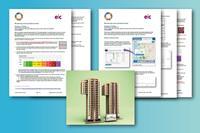Monitoring air pollution is critical for our cities to be safe in the future
This resource shows how learners can access and evaluate real-time data about atmospheric pollutants in their local area to make the teaching of this topic at age range 14–16 more relevant for them and their future. Extension questions are provided to use the activity with learners age 16–18.

Sustainability in chemistry

This resource accompanies the Education in Chemistry article Building better cities through chemistry where you will find more support and suggestions for how to connect your current chemistry teaching with UN sustainable development goal 11: make cities and human settlements inclusive, safe, resilient and sustainable. Link directly to the goal to give this activity an engaging and relevant context.
With air pollution currently responsible for 9% of deaths globally,[1] we must reduce it if we are to meet the requirement of Goal 11 for our cities to be safe in the future. It is important to monitor levels of key pollutants to see how well initiatives such as congestion pricing zones and electric vehicles are affecting air quality.
The activity gives learners a chance to look at current and historical levels of the pollutant nitrogen dioxide in the town or area where they live.
Where to find the data
There are a number of websites that you can use (see the table below). They all offer an interactive map. You can click on a particular site of interest to access the data for that site.
The data immediately available by this method will usually be the latest readings of different pollutants taken by the monitoring site. If you want to save the data, you can download it in *.csv format that will open in most spreadsheets where you can do further analysis.
| Data provider | Website for the interactive map | Area covered |
|---|---|---|
|
DEFRA (UK Government) |
All of the UK |
|
|
EPA (Irish Government) |
Republic of Ireland |
|
|
Regional governments for the UK |
England |
|
|
Scotland |
||
|
https://airquality.gov.wales/ (click on the ‘latest measured air quality’ tab) |
Wales |
|
|
Northern Ireland |
Using this type of data students could explore, for example, the difference in pollutant levels between urban and more rural sites in the region where they live.
The sites also offer some on-screen graphs showing changes in pollutant levels over specified time periods, although the sites vary as to the time periods that they provide.
Find examples and further guidance in the teacher notes. The student worksheet provides questions to guide your learners’ research and helps them to evaluate the data they collect. Extension questions guide learners to complete calculations based on the data.
Historical data
To investigate the effects of initiatives to improve air quality, it is necessary to access data over a longer period of time. For a given monitoring site, you can select a whole year or more for the UK and up to a month for Ireland. However, doing this can produce a very large amount of data, as readings are typically taken a number of times every day. Some of the sites do offer average readings for each day to save having to simplify the data manually in a spreadsheet.
Link health to your lessons on air pollution and enhance your teaching in this topic area with the UN Sustainable development goal 3 (ensure healthy lives and promote well-being for all at all ages) article in this series.
More resources
- If you don’t have time to complete the research for the activity, see the resource Assessing air pollution levels, which uses historical data on NO2 levels as the basis for a data analysis exercise aimed at leaners 11–14 years.
- Discover how air pollution impacts our health with Taking care of the air, including a demonstration, experiment, worksheets and more resources.
- Use our Burning hydrocarbons worksheets for 14–16 years to assess knowledge of the underlying chemistry and apply it in context.
- Inspire learners and link to careers with this video job profile featuring Saba, a principal air quality consultant.
- Highlight the importance of trees in combatting climate change and the overlap between chemistry and the other sciences.
Downloads
Monitoring local pollutant levels: teacher notes
Handout | PDF, Size 0.51 mbMonitoring local pollutant levels: teacher notes
Editable handout | Word, Size 1.42 mbMonitoring local pollutant levels: student worksheet
Handout | PDF, Size 0.19 mbMonitoring local pollutant levels: student worksheet
Editable handout | Word, Size 0.18 mb



















No comments yet